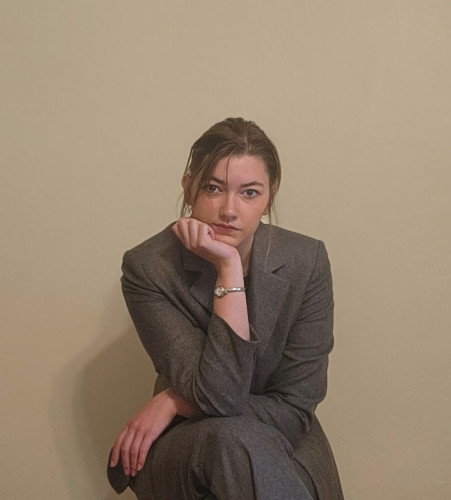Senior Amanda Grant, innovative artist and historian, awarded national Beinecke Scholarship
Growing up in Clayton, Wisconsin, a town of 571 people, Amanda Grant never imagined she’d be conducting research in Uganda and speaking Swahili.
Yet Grant, a rising senior at the University of Wisconsin–Madison, has done all that and much more during a college career that already has made her a standout on the national stage. Her latest honor is a Beinecke Scholarship, a prestigious national award established in 1971 to support the graduate education of students with exceptional promise. Twenty scholarships were awarded this year. Each award provides $35,000 for graduate study in the arts, humanities or social sciences.

Amanda Grant
Grant is majoring in history (with honors), art history, and African cultural studies. She will graduate in December 2025 and intends to pursue a PhD in history.
Grant’s work traces the intimate and institutional histories of gendered health care in East Africa, from projects on missionary training schools to contemporary storytelling.
“I’m interested in how women navigated, resisted, and influenced health care practices within colonial structures of control, which included gender,” she says.
Grant was first drawn to African history by the process — historians of East Africa must use creative methodologies due to limited archival sources, she says. Inspired by their work her sophomore year, she wrote a paper on the first cohort of Ugandan maternity students at Mengo Hospital’s Maternity Training School in Kampala, Uganda. The paper won the UW–Madison History Department’s Farha Tahir Award for African History. Grant presented the paper at the 2025 American Historical Association conference.
Understanding the importance of language to historical research, Grant committed to learning Swahili, participating in competitive language programs abroad funded by the U.S. Departments of State and Education.
Last summer, Grant was a visual storyteller intern for the nonprofit organization Merry-Go-Strong in Gatunga, Kenya. She created an illustrated biography, developing a visual narrative style to support women’s literacy initiatives while promoting local history.
“I have been an artist for as long as I can remember, but for the first time, this project created a tangible connection between my artistic practice and historical research,” Grant says.
Grant is working on two research projects: independent art history research on crocheted baskets in Gatunga; and a history honors thesis that revisits the Maternity Training School at Mengo Hospital. “With these projects, I’m exploring how visual sources can be reinterpreted in innovative ways,” she says.
Says Neil Kodesh, the Allan H. Selig Distinguished Leadership Professor of History and Grant’s senior thesis advisor: “Raised in a small town in rural Wisconsin, Amanda never imagined she would have the opportunity to develop expertise in the histories of seemingly distant regions of the world like East Africa. She has taken advantage of these opportunities with an energy, a drive, and an intellectual fearlessness that exceeds anything I’ve encountered in an undergraduate student in my twenty years at UW–Madison.”
Grant recently was awarded the Barry L. Popkin Senior Honors Thesis Award, a Hilldale Research Fellowship, and a Davis/Gerstein Undergraduate Research Award to support archival research in Uganda and London.
Coming from rural Wisconsin, Grant says higher education often felt distant. Knowing this, she is committed to promoting the accessibility of education, particularly the arts and history, in her hometown. Grant is a recipient of Bucky’s Pell Pathway, a UW–Madison initiative that covers the full cost of an undergraduate degree for eligible students from Wisconsin.
“Growing up in a small community gave me a deep appreciation for people, a perspective that’s evident in how I move through academia, with the guidance of mentors, and in the kind of history I write, which centers on individuals,” Grant says. “Yet that same upbringing was isolating. Studying history has expanded my worldview — my life — in ways I’m still learning to articulate. For that, I’m incredibly grateful.”
Grant is the eighth UW–Madison student to receive a Beinecke Scholarship. UW–Madison also had a winner last year — Axell Boomer, a history and religious studies double major from South Beloit, Illinois. A complete list of past UW–Madison Beinecke Scholarship winners is available on the Undergraduate Academic Awards website.




